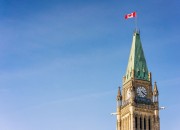Like a lot of climate colleagues from around the world, I'll be packing my flip-flops later this week for the UN climate talks in Cancun, Mexico. Although I've never been much of a beach person, I'm hoping that the two-week conference can deliver some of the building blocks we need for a global effort to tackle climate change.
A year ago, we headed into a similar meeting in Copenhagen hoping to see countries agree to a binding deal. Those negotiations fell far short, and as a result, expectations are more modest this time: Cancun is widely understood as a potential stepping stone on the path to a full agreement a year from now, at the South Africa talks in 2011.
 Or to put it in terms that Canadians vacationers might relate to, we're not expecting to get the five-star all-inclusive deal in Cancun. But this Cancun experience can still be much more than a stay at a discount spring break hostel. In Mexico this winter, we're looking for a nice beachfront villa with a good view of a global climate deal.
Or to put it in terms that Canadians vacationers might relate to, we're not expecting to get the five-star all-inclusive deal in Cancun. But this Cancun experience can still be much more than a stay at a discount spring break hostel. In Mexico this winter, we're looking for a nice beachfront villa with a good view of a global climate deal.
In advance of the talks, which are scheduled to wrap up on December 10, Pembina has prepared a briefing note outlining the main issues on the table from a Canadian perspective.
Although countries will be discussing a long list of issues, a successful negotiation in Cancun will require:
- Agreeing on an approach to transparency about emission reduction commitments. In the jargon of the negotiations, this is known as "MRV," for the "measurement, reporting and verification" of countries' commitments.
- Launching a new global climate fund. This fund would support developing countries as they reduce their own emissions and adapt to the impacts of climate change.
Cancun will be my fourth UN climate conference. Over and over, I've seen that the countries who shine on the world stage are those taking real action at home. So while I would love to see Canada make a constructive contribution to all of the issues on the agenda, there are lots of reasons to worry about Canada's potential role in Cancun.
Some of those reasons include:
- The government's decision to weaken its 2020 target after Copenhagen,
- The lack of any effective plan to meet that 2020 target, and
- The federal government's decision to wait for the U.S. before implementing key climate policies, a "strategy" that now looks more like a recipe for delay.
 Fortunately, the talks will be hosted by a country that is, arguably, North America's leader in tackling climate change. Like all countries, Mexico could be more ambitious, but there's no question that they've done their homework, preparing the ground for an economy-wide approach to tackling climate change. We describe Mexico's approach — and the role that financial support from countries like Canada can play in realizing those plans — in a fact sheet called "Fighting Climate Change in Mexico."
Fortunately, the talks will be hosted by a country that is, arguably, North America's leader in tackling climate change. Like all countries, Mexico could be more ambitious, but there's no question that they've done their homework, preparing the ground for an economy-wide approach to tackling climate change. We describe Mexico's approach — and the role that financial support from countries like Canada can play in realizing those plans — in a fact sheet called "Fighting Climate Change in Mexico."
Canada's track record makes it much more difficult to be optimistic about our country's potential role. But to use a phrase that was popular with John Baird the last time he was Environment Minister, Cancun offers a chance for the federal government to finally "turn the corner."






